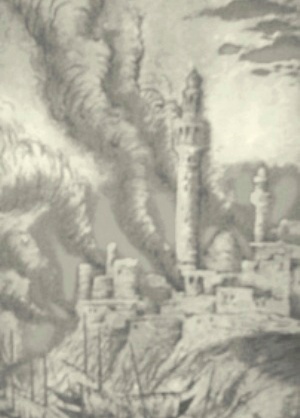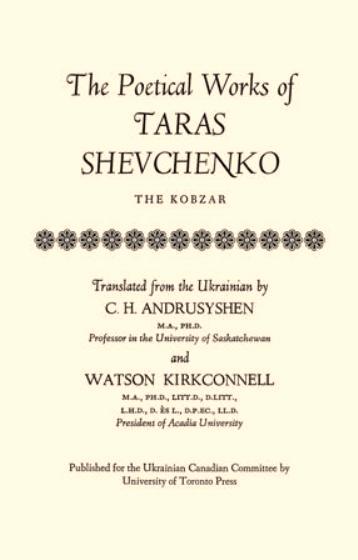|
Taras Shevchenko
HAMALIYA (1)
("Hamaliia" / "Гамалія")
Translated by С.H. Andrusyshen and Watson Kirkconnell
“Not a breath of air is felt, no wind or wave,(2)
Comes from our dear Ukraine!
Do men take counsel there to rout the Turk? —
We listen here in vain."
“Blow, blow, O wind, across the vast sea blow,
Across the mighty Plain! (3)
Dry all our tears, drown out the fetters clank
And put to flight our fain!
“Roar, roar, O azure sea, as on you roll
Beneath those sturdy ships
That each bright Cossack caps and warriors bears
As towards our shore it dips!
“O Lord, our God! They may not reach us here,
But bring them none the less:
In their exploits well hear the Cossack fame
And die without distress
O, thus in Scutari the Cossacks were singing,
The wretched ones sang with their tears running down,
And tears to their sorrow new torment were bringing.
Old Bosphorus shook with a wondering frown,
For new to his ears was the Cossack lamenting,
He groaned like a grey ox and shook his broad hide;
He roared and from rocky ribs fiercely commenting
Sent waves far away to the sea's farther side.
And back roared the sea in the Bosphorus' chanting
And drove it along to the Liman's (4) last reach,
While Liman in turn, in its wave's mournful ranting,
Passed on to the Dnieper that sorrowful speech.
Our mighty oldster (5) bellowed out
Till foam dripped from his whiskered snout:
“O brother Meadow,(6) do you sleep?
Sister Khortitsia,(7) hear and leap!"
And back the Isle and Meadow roared:
“We hear! We hear!" With one accord,
Bold barks upon the Dnieper throng
And Cossacks burst into a song:(8)
“In the land of the Turk, on the further side,
A rich house stands in its lordly 'pride.
Heigh-ho! Roar, O sea,
Roar and hatter the cliffs for me!
For were off on a visiting spree!
“In the land of the Turk we could surely find
Thalers and ducats to sate the mind.
Heigh-ho! But not for loot
We go, hut to slash the infidel hrute
And to free all our brothers to hoot!
“In the land of the Turk there are guards that crouch
While the pasha sleeps on a silken couch.
Heigh-ho! At the paynim foe
With never a moment's pause we go,
And ours is the freedom and fame, we know!”
While thus they sail, in songs assize,
The sea feels stormy winds arise.(9)
But Hamaliya, at their head,(10)
Directs his bark devoid of dread.
“Hamaliya! Our hearts grow faint!
The sea is wild!”—
“Feel no constraint!”
He cries, and in safety they sink and pass
Through the troughs of the mountainous sea’s morass.
In its harem, its Eden, Byzantium drowses;
While Scutari slumbers, the Strait gurgles loud;
It howls in its fury to warn all the houses,
To rouse to its peril Byzantium proud.
“Come, wake it not, Bosphorus, or you will rue it!
I’ll cover your white ribs with silt and with sand!
(The blue sea roars out.) You’re forbidden to do it —
Great guests for the sultan I bring to your strand.”
And thus did the sea keep the narrows from leaping.
(It loved the staunch Slavs with their forelocks so bold.)
The Bosphorus paused and the Turks went on sleeping;
The sultan the silks of his harem enfold.
But deep in their dungeon the Cossacks were waking.
What might they expect in the chains that they bore?
And yet in their fashion a prayer they were making
That passed on the waves to the far distant shore:
“Beloved God of far Ukraine,
Let not free Cossacks thus remain
To perish in a foreign land!
What shame on earth for this our band
And shame on Doomsday to arise
And show our shackles in the skies
When to thy Judgment-seat we come
And bear the chains of earthly doom
For all to see it!”—
“Slash and fell!
Cut down the Muslim infidel!”—
The cry is heard behind a wall.
Who could have uttered such a call?
“Hamaliya! Our hearts grow faint!
Scutari rages!”—
“Without restraint
Slash and strike!” Hamaliya cries,
And stands on the rampart before all eyes.
Scutari loud with its cannon roars;
The angry foe from his barracks pours.
The Cossacks press in a fierce attack
And roll the janissaries back.
In Scutari Hamaliya rushes
As if in a hell where fire gushes;
The dungeon portal himself he rends
And looses the chains of his captive friends.
“Fly out, grey falcons, to the mart,
And of the booty take your part!”
The Cossacks started in surprise,
For Christian speech in such a guise
For many a year they had not heard.
Night, too, was startled at that word,
For the old mother ne'er had seen
The Cossacks' fierce revenge, I ween.
Be not affrighted, see at least
The fervour of a Cossack feast!
At midnight it was bright as day
To watch the feast get under way!
These are not sneak-thieves, wan and shaken,
Who without mutton eat their bacon.
“Let’s light the scene for all to see!”
And to the clouds in ardour free
The masted ships flame-torches raise
And set all Scutari ablaze.
Byzantium at last arouses
And opes the eyes of all its houses;
Gnashing its teeth, in rage arrayed,
It swims across to offer aid.
Byzantium is full of ire.
It seeks to grip the shore of fire
But screams and rises up and dies
As sharp blades silence all her cries.
Like hell, Scutari flaming goes;
The market-place with bloodshed flows
And swells the waters of the Strait.
Like blackbirds in a grove irate,
The daring Cossacks dart with clangour.
No mortal may escape their anger!
At flames the Cossack warriors scoff.
They tear down walls and carry off
Capfuls of silver and of gold
To stow within their vessels' hold.
Scutari bums; their task is done;
Now gathers round each dauntless one
To light his pipe at the burning fire;(11)
Then they mount their ships at their hearts' desire
And cleave the waves as the seas roll higher.
They sail with the greatest of nonchalance,
As if on an outing of careless chance;
And then, as the Zaporozhians do,
Strike up a song for the gallant crew:
“Hamaliya, our leader fine
Is a dauntless leader across the brine;
He gathered his boys and roamed the main
The glory of Cossack arms to gain
By setting our hapless brothers free
Out of their Turkish captivity.
When Hamaliya journeyed down
To the very heart of Scutari town,
He found the captives in foul pollution
Waiting in chains for their execution.
Oh, what a shout our leader raised:
‘Brothers, well live, may God be praised!
In rich red wine our woes well drown
And strike the janissaries down,
And with costly rugs and satin shawls
Well cover our peasant cottage waїls!,
On the field of battle the Cossacks strain,
Out on the feld to harvest the grain;
The grain of battle they reaped and stooked,
And cried together as round they looked:
'Hamaliya, we give you glory!
All of the world will prize your story,
And all the fair Ukrainian land
Because you saved our captive
Band From dying on a foreign strand! ”
They sail and sing to this bold idea;
Behind them sails dauntless Hamaliya,(12)
Like an eagle watching its brood with care.
A wind from the Dardanelles follows there
To warn if Byzantium tries pursuit —
But she is afraid of the monk's (13) repute
Who set old Galata once ablaze,
Or she fears lest Ivan Pidkova raise
His roistering comrades of other days.
So on they sail...
From behind the hills
The sun on the waves its redness spills;
Before them spreads the inviting sea,
Gurgling and humming pleasantly.
Hamaliya! The wind is blowing!...
Into the sea we are boldly rowing!...
And they dipped and were hidden behind the waves,
The rosy crests of the billowy caves.
|
|

